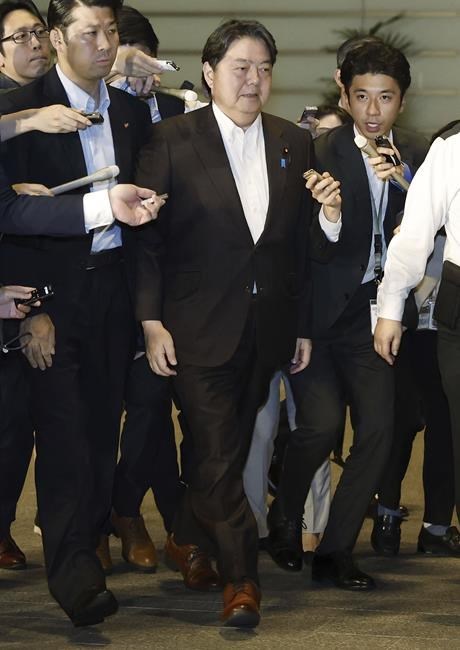SEOUL, South Korea (AP) — North Korea launched two short-range ballistic missiles toward its eastern waters on Thursday, the South Korean military said, in a resumption of its weapons testing activities to protest just-ended South Korean-U.S. live-fire drills, which it views as an invasion rehearsal.
The North Korean launch is its first since it failed in an attempt to put its first spy satellite into orbit in late May.
South Korea’s Joint Chiefs of Staff said it detected the North Korean launches from its capital region on Thursday evening. It said South Korea's military boosted its surveillance posture and maintains readiness in close coordination with the United States.
Japan’s Defense Ministry also said it detected a possible ballistic missile fired by North Korea. Japan’s Coast Guard alerted vessels in waters between the Korean Peninsula and Japan and the North Pacific seas, warning them to avoid falling objects. There were no immediate reports of damage to ships or aircraft.
The launch came hours after South Korean and U.S. troops ended a fifth round of large-scale live-fire drills near the Koreas’ heavily fortified border earlier Thursday. About 30 minutes before the launch, North Korea's military also vowed an unspecified response to its rivals' drills, which it called “provocative and irresponsible.”
“Our response to (the South Korean-U.S. drills) is inevitable,” an unidentified spokesperson of the North Korean Defense Ministry said in a statement carried by state media. “Our armed forces will fully counter any form of demonstrative moves and provocation of the enemies.”
Tensions have risen in past months as the pace of both North Korean weapons tests and U.S.-South Korea military exercises has increased in tit-for-tat responses. North Korea has test-fired about 100 missiles since the start of 2022.
On May 31, a North Korean long-range rocket carrying its first spy satellite crashed off the Korean Peninsula's west coast. North Korea admitted to its failure and vowed to push for a second launch. A spy satellite is among a slew of high-tech weapons systems North Korean leader Kim Jong Un wants to introduce to cope with what he calls U.S. hostility.
“This launch is not to make up for the recent failure, because North Korea will almost certainly make another attempt later to put a spy satellite into orbit,” said Leif-Eric Easley, a professor at Ewha University in Seoul. “The message of today’s missiles is more likely Pyongyang’s protest against South Korea’s combined defense exercises with the United States, as well as a demonstration of North Korea’s own military capabilities and readiness.”
Thursday's South Korean-U.S. exercises were the fifth and last round of live-fire drills that began last month. This year’s drills were the biggest of their kind since they began in 1977. Each of this year’s five rounds of drills involved 2,500 South Korean and U.S. troops and about 610 military assets including stealth fighter jets, attack helicopters, tanks and drones from both countries, according to the South Korean Defense Ministry.
South Korean President Yoon Suk Yeol and other senior South Korean and U.S. military officials observed Thursday's drills.
“Only a strong military — which can fight and defeat the enemy and which the enemy can’t even dare to challenge — can guarantee the freedom, peace and prosperity of the Republic of Korea,” Yoon said at the training site, using South Korea’s official name.
North Korea's state media recently accused South Korea and the U.S. of using the firing drills to master “military threat and blackmail and war tactics” against North Korea.
On Thursday, top security officials from the United States, South Korea and Japan held trilateral talks in Tokyo.
The three officials engaged in discussions to tighten cooperation and coordinate more broadly with the international community to counter North Korean nuclear and missile activities, according to the South Korean presidential office.
U.S. National Security Advisor Jake Sullivan reiterated Washington's commitment to the defense of South Korea and Japan, and the national security advisors discussed recent efforts to strengthen both alliances to the benefit of the region, the White House said in a statement.
__
Associated Press writer Mari Yamaguchi in Tokyo contributed to this report.
Hyung-jin Kim And Kim Tong-hyung, The Associated Press

